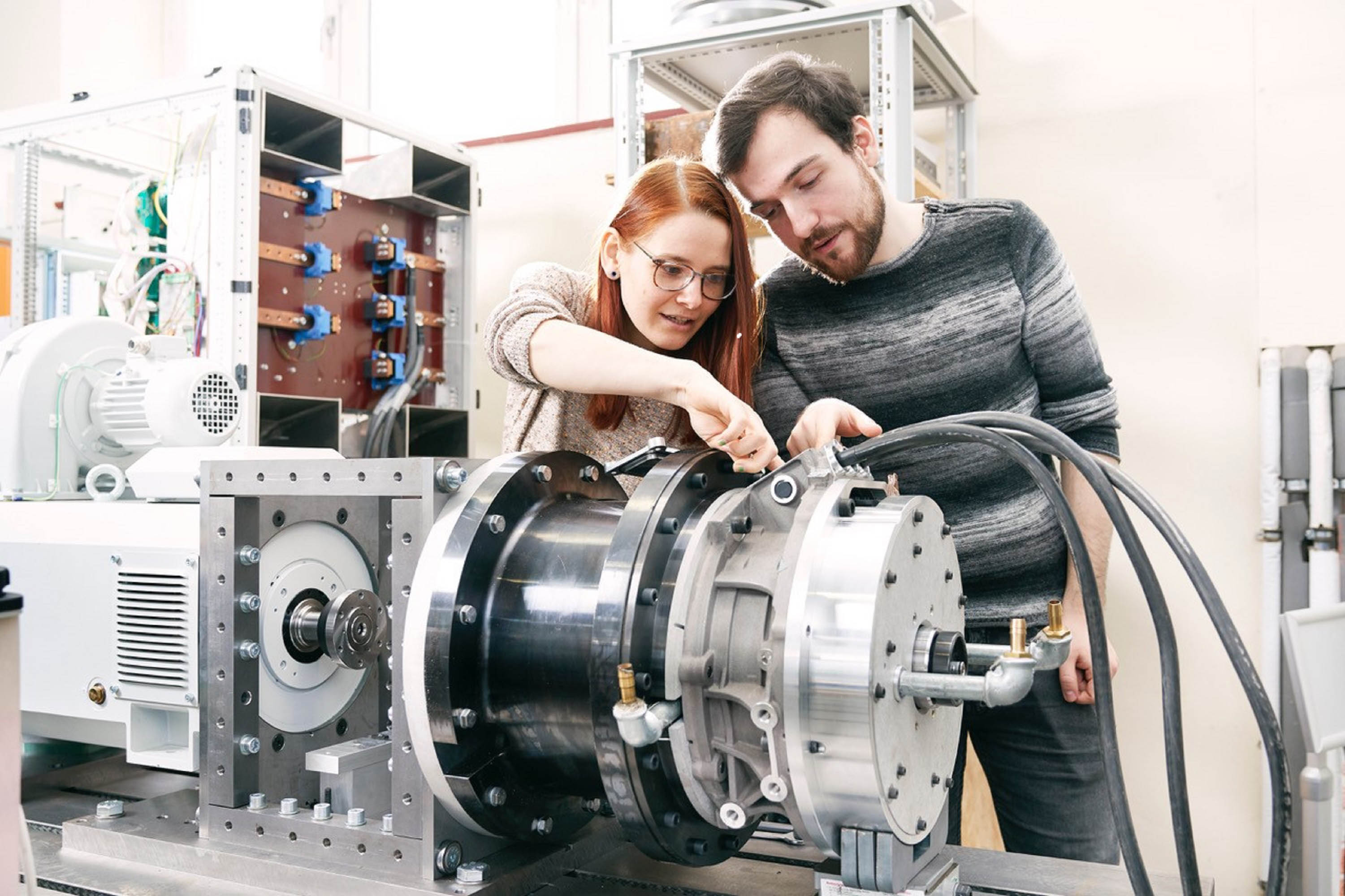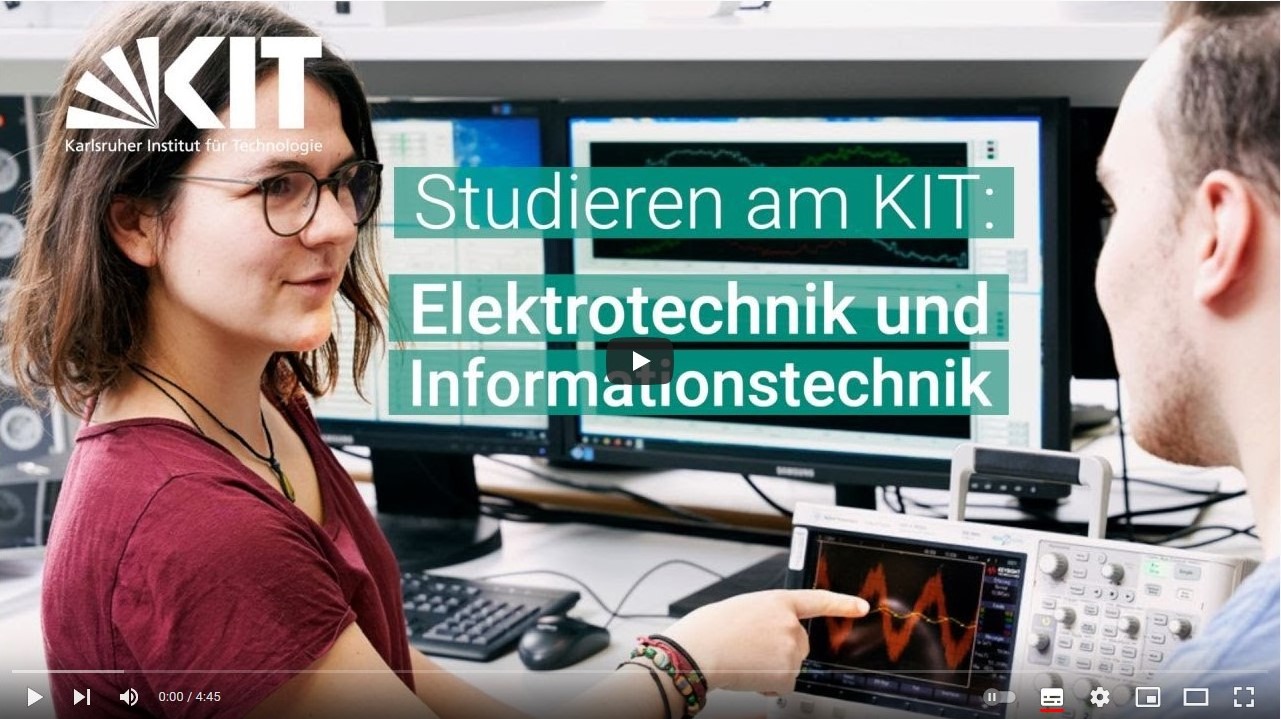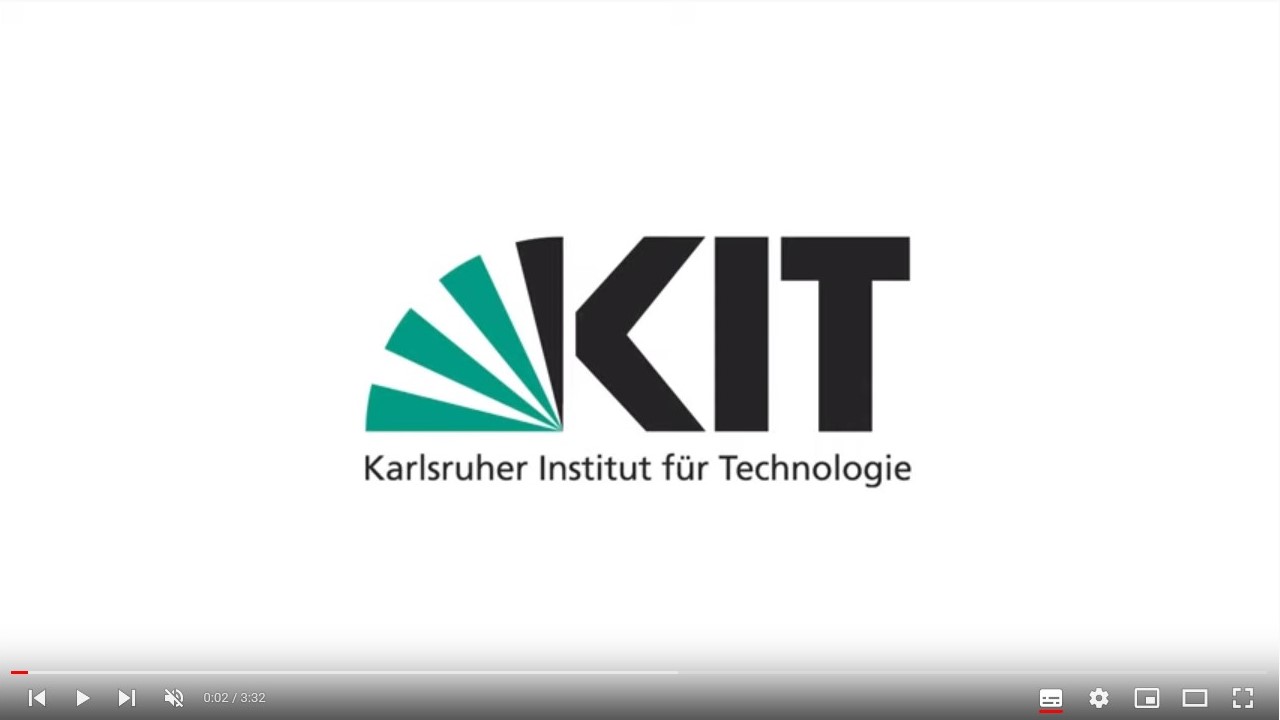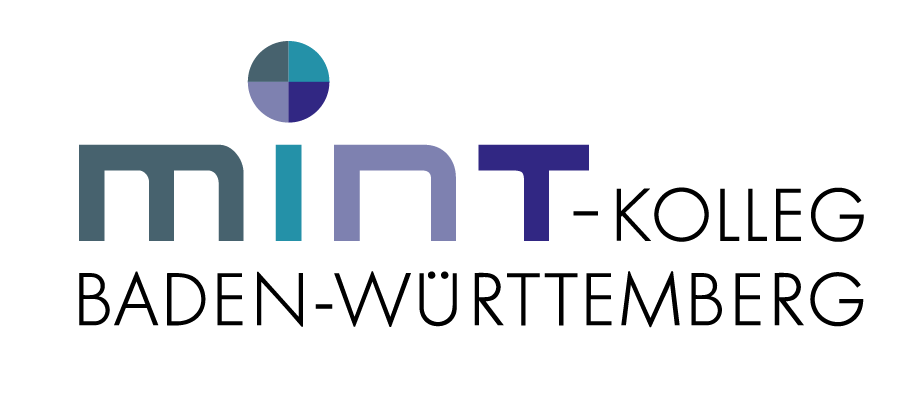Degree: Bachelor of Science (B.Sc.)
Regular program length: 6 semester (full-time program)
Credit points (ECTS): 180 credit points
Language of instruction: German
Higher semester: no
Higher semester: winter and summer term
First semester: September 15
Higher semester: September 15 for winter term, March 15 for summer term
First semester: July 15
Higher semester: July 15 for winter term, January 15 for summer term
Studiengangsbeschreibung
Worum geht's?
Die Elektrotechnik und Informationstechnik durchdringt mittlerweile alle Bereiche unseres Lebens. Automatisierung, Elektrifizierung und Digitalisierung prägen die heutige Zeit, von der Elektromobilität bis zu Assistenzsystemen in der Altenpflege. Der Bachelorstudiengang Elektrotechnik und Informationstechnik am KIT vermittelt die mathematischen, physikalischen und technischen Grundlagen, um Funktionsweisen zu verstehen und neue Produkte zu entwickeln. Ein Pflichtbereich mit Mathematik, Physik und Grundlagen der Elektro- und Informationstechnik bildet den Boden für anwendungsbezogene Fächer und spätere Spezialisierungen. Die Umsetzung des Erlernten ist in Workshops, einer Projektarbeit und einem Berufs- oder Forschungspraktikum eingeplant. Eine weitere Spezialisierung ist in einem anschließenden Masterstudium möglich.
Program structure
During your studies, you have various subjects, which consist of one or more modules. A module deals with a specific topic and consists of one or more courses. In the module handbook for your degree program, you will find a description of the modules and their subject assignment as well as a study plan. This gives you an orientation as to which courses you should attend in which semester in order to complete your studies within the standard period of study. It takes into account a balanced distribution of courses over the individual semesters. It also ensures that you are first taught the important basics before moving on to more advanced topics. Your individual course of study may differ from this.
In den ersten Semestern erwirbst vorwiegend die für deinen Studiengang wichtigen Grundlagen aus der Mathematik, der Elektrotechnik sowie der Informationstechnik. Neben den fest vorgegebenen Modulen des Grundlagenstudiums hast du insbesondere in den höheren Semestern einige Wahlmöglichkeiten. Ab dem 3. oder 4. Semester entscheidest du dich für eine Vertiefungsrichtung in Form eines Wahlpflichtfachs. Folgende Fächer sind in dem Studiengang zu absolvieren:
- Mathematisch-physikalische Grundlagen (42 LP): In diesem Fach erlernst du die relevanten mathematischen Grundlagen deines Fachs wie zum Beispiel Höhere Mathematik und Wahrscheinlichkeitstheorie.
- Elektrotechnik (28 LP): Hierzu gehören Lineare Elektrische Netze, Elektronische Schaltungen und beispielsweise Elektromagnetische Felder und Wellen.
- Informationstechnik (33 LP): Deine Grundlagen werden abgerundet durch Kenntnisse der Digitaltechnik, Informations- und Automatisierungstechnik, Mess- und Regelungstechnik und auch Grundlagen der Automatisierungstechnik.
- Projektarbeit (8 LP): Hier erlernst du in einer kleinen Gruppe von bis zu fünf Studierenden am Beispiel eines Projektthemas, welches du dir aus einem großen Angebot aussuchen kannst, die Regeln wissenschaftlicher Praxis und wissenschaftliche Methoden.
- Überfachliche Qualifikationen (3 LP): Neben deiner fachlichen Ausbildung kannst du zusätzliche überfachliche Qualifikationen erwerben. Profitiere dabei von dem riesigen Angebot des KIT. Seien es Sprachkurse, eine Auseinandersetzung mit gesellschaftlichen Themen, Präsentations- oder Schreibtechniken oder ganz einfach ein Kurs, der deiner Work-Life-Balance zuträglich ist. Du kannst frei wählen.
- Wahlpflichtfach (36 LP): Du entscheidest dich für eine der folgenden Vertiefungsrichtungen:
- Elektrische Energiesysteme und Elektromobilität
- Informations- und Kommunikationstechnik
- Automatisierung, Robotik und Systems Engineering
- Mikroelektronik, Photonik und Quantentechnologien
- Allgemeine Elektrotechnik und Informationstechnik
Berufspraktikum
Im Bachelorstudiengang Elektrotechnik und Informationstechnik ist ein 12-wöchiges Berufspraktikum vorgesehen, das in der Regel im 5. und 6. Semester absolviert wird. Du hast die Wahl zwischen einem Industriepraktikum und einem Forschungspraktikum. Die Suche nach einem Praktikumsplatz liegt in deiner eigenen Verantwortung. Der Career Service des KIT oder die Hochschulgruppe IAESTE kann dir beim Suchen eines Praktikumsplatzes behilflich sein. Das Forschungspraktikum kann auch an einem KIT-Institut absolviert werden. Du kannst das Praktikum natürlich auch im Ausland absolvieren, wenn du das möchtest. Die möglichen Inhalte findest du in den Praktikumsrichtlinien für den Studiengang. Das Praktikantenamt steht dir bei der Planung gerne zur Seite.
Stays abroad
KIT offers a wide range of options for stays abroad, from individual courses to a year abroad. Especially if you are interested in a longer stay abroad, it is advisable to contact the International Students Office early on.
Die KIT-Fakultät für Elektrotechnik und Informationstechnik bietet sogar ein Doppelabschlussprogramm mit der Universität Budapest, sowie ein den Bachelor- und Masterstudiengang umfassendes Doppelabschlussprogramm mit der Universität Grenoble in Frankreich an.
Bachelorarbeit
Am Ende deines Bachelorstudiums fertigst du deine Bachelorarbeit im Umfang von 15 LP an, eine wissenschaftliche Arbeit, die es dir ermöglicht, dein erlangtes Wissen und deine Fähigkeiten anzuwenden und zu vertiefen. Normalerweise behandelt sie ein spezifisches Thema in deinem Studienfach und erfordert eigenständige Forschung, Analyse und das Verfassen einer schriftlichen Ausarbeitung. Die maximale Bearbeitungsdauer der Bachelorarbeit beträgt sechs Monate. Die Bachelorarbeit kann auch extern zum Beispiel in einem Unternehmen angefertigt werden. Zur Bachelorarbeit gehört auch eine Präsentation deiner Ergebnisse.
Weitere Informationen
Außer dem Modulhandbuch ist unsere Studiengangbroschüre eine nützliche Informationsquelle. Sie behandelt auch Themen wie Bewerbungsverfahren, Studienvorbereitung und Berufsperspektiven.
Qualification profile of the graduate
The Bachelor's degree program serves to impart scientific fundamentals and methodological competence in electrical engineering and information technology.
Studies are aimed at enabling students to successfully pass a Master's degree program and to apply the knowledge acquired in the respective professional field.
Mandatory subject modules convey the basics for studies of electrical engineering and information technology and form the theoretical background for advanced Master's degree programs.
The student can choose an area of specialization by selecting elective modules.
Berufsperspektiven
Mit dem Bachelor erwirbst du den ersten berufsqualifizierenden Abschluss. Wer nicht das erworbene Wissen im Masterstudium vertiefen möchte, kann direkt in den Beruf einsteigen. In der Industrie, bei Behörden, in IT-Unternehmen, Ingenieurbüros oder Bauunternehmen gibt es zahlreiche Einsatzmöglichkeiten. Anwendungsbereiche sind Energietechnik, Automatisierung, Medizintechnik, Mikro- und Nanoelektronik, Luft- und Raumfahrttechnik, Fahrzeugtechnik, Kommunikationstechnik und vieles mehr. Die Tätigkeiten reichen von der Entwicklung und Optimierung von Produkten oder der Einrichtung und Wartung von Anlagen bis zu Vertrieb und Management. In der Elektro- und Informationstechnik übersteigt seit Jahren die Zahl der freien Stellen die der Arbeitssuchenden.
Besonderheiten des Studiengangs
Besonderheiten von Elektrotechnik und Informationstechnik B.Sc. am KIT
- Wissenschaftliche Tiefe in Verbindung mit praktischen Anteilen
- Ganzheitlicher Ansatz (Projektarbeit)
- Zahlreiche Auslandskooperationen (Eucor, ERASMUS+ etc.)
- Doppelabschlussprogramme mit BME Budapest und INP Grenoble
- Ausführliche Orientierungsphase für Erstsemester
- Lernunterstützung durch MINT-Kolleg und Tutorien
What KIT has to offer
- central campus close to the city forest and right next to the city center
- orientation week before the start of lectures
- 24-hour library offering single and group working places
- wide range of inexpensive catering options (dining hall, cafeteria, Koeri and Pizzawerk)
- numerous interdisciplinary offers for personal and professional development, e.g. Lernlabor, Schreiblabor and Perspektivenlabor
- study abroad, e.g. via Erasmus
- excellent university sports facilities with a large selection of sports
- comprehensive cultural offerings with university orchestras, choirs and theater groups
- extensive support for career entry and self-employment
- Lernraum app
- internationally oriented degree programs and diverse exchange programs
- modern laboratories and practical teaching methods
- diverse student initiatives, clubs and opportunities to actively participate in campus life
- stay in touch after graduation via the alumni network
Admission requirements
Higher education entrance qualification (HZB)
Germans and persons of equal status to Germans (i.e. EU/EEA nationals and non-EU/EEA nationals with a German higher education entrance qualification) are entitled to study at KIT if they have one of the following qualifications:
- General higher education entrance qualification (Abitur)
- (relevant) subject-restricted higher education entrance qualification (not Fachhochschulreife)
- Delta examination of the University of Mannheim (for holders of a Fachhochschulreife)
- recognized advanced vocational training (e.g. master craftsperson) or vocational training, professional experience and aptitude test for those with professional qualifications
For further options, see §58 of the "Landeshochschulgesetz" (State Higher Education Act).
Please note: German nationals with a foreign school-leaving qualification must have the relevant "Regierungspräsidium" (regional authority) certify that their qualification is equivalent to the German Abitur.
For non-EU/EEA nationals with a foreign school-leaving certificate (hereinafter also referred to simply as non-EU/EEA nationals), the school-leaving certificate from some countries is recognized as a direct university entrance qualification in Germany. In many cases, however, in addition to the school-leaving certificate, a university entrance examination and/or a successful year of study in the home country and/or the "Feststellungsprüfung" must be proven with valid documents in order to be allowed to study a bachelor's degree in Germany. You can find the country-specific regulations in the DAAD admissions database or on the Anabin website (in German only) of the "Zentralstelle für ausländisches Bildungswesen" (Central Office for Foreign Education). Further information is available from the International Students Office.
Sprachvoraussetzungen und -nachweise
Für den Bachelorstudiengang Elektrotechnik und Informationstechnik benötigst du ausreichende Kenntnisse der deutschen Sprache. Deine Deutschkenntnisse müssen mindestens dem Niveau C1 des Gemeinsamen Europäischen Referenzrahmens für Sprachen (GER) entsprechen.
Proof of sufficient German language skills
Your higher education entrance qualification (HZB) is sufficient proof of your German language skills,
-
if you obtained it at a German-speaking school in Germany or abroad,
-
if you are a graduate of a bilingual secondary school in Germany or abroad and have passed a bilingual German examination, such as the AbiBac or the Gemischtsprachiges International Baccalaureat (GIB) or
-
if you graduated from a foreign school, but there is another official agreement with the respective country on the recognition of your school-leaving certificate or language certificate as proof of language proficiency for university studies in Germany.
A complete list of foreign school-leaving qualifications and language certificates that are recognized as proof of sufficient German language skills can be found on the website of the Kultusministerkonferenz (Standing Conference of the Ministers of Education and Cultural Affairs of the Länder in the Federal Republic of Germany).
If you did not obtain your higher education entrance qualification at a German-speaking institution, you must provide a separate language certificate - regardless of your nationality. Only the following are accepted
- the passed „Prüfungsteil Deutsch“ of the Feststellungsprüfung,
- the passed DSH with the overall result DSH-2,
- the passed TestDaF level 4 in all four parts of the exam (reading comprehension, listening comprehension, written expression, oral expression) or
- a comparable, recognized certificate of sufficient German language skills.
To find out which other recognized certificates can be accepted as comparable by KIT, please contact
- as a German or German-equivalent applicant: Studierendenservice
- as an applicant with non-EU citizenship: International Students Office
Please note:
Language certificates are extremely important application documents that can prevent your enrollment if you do not submit them on time. Therefore, check early on in the application process whether you have the necessary language certificates for your degree program and, if necessary, plan to take one of the language tests mentioned above. The deadline by which you must submit language certificates corresponds to the enrollment deadline stated in your admission offer. In justified cases, you can apply for an extension of this deadline. The extension can be granted until the start of the lecture period at the latest.
Additional necessary requirements for enrollment
For Germans and those with German equivalent status, an additional necessary requirement for enrollment is proof of participation in a study orientation test (e.g. www.was-studiere-ich.de) or a study orientation consultation in accordance with §7 of the "Landeshochschulgesetz" (State Higher Education Act), e.g. by the Student Advisory Service (ZSB) of KIT. Non-EU/EEA nationals do not have to provide this proof.
Application portal
Application for the 1st semester
Application for a higher semester
Study preparation
Prepatory courses at KIT: The MINT-Kolleg offers prospective and first-year students support in natural science and technical subjects (STEM).
In addition, the KIT-Departments offer special preliminary courses before the start of the semester program during the "O-Phase" (orientation week).
Support during your start at KIT
The KIT offers support for all first-year students in order to have a successful start of their studies. Numerous orientation events and mentoring programs at the KIT-Departments help students to make friends, orientate themselves and find support where needed. The central online portalstudienstart.kit.edu is a first guide to all important offers, brings together all relevant information and contains helpful hints for a successful start of your studies:
- advisory centers
- mentoring programs
- info sessions
- workshops
- extensive online information
Contacts
Student advisor
Student advisory services (ZSB)


Karlsruher Institut für Technologie (KIT)
Zentrale Studienberatung (ZSB)
Engelbert-Arnold-Str. 2
76131 Karlsruhe
Karlsruher Institut für Technologie (KIT)
Studierendenservice
Kaiserstr. 12
76131 Karlsruhe
First point of contact for international applicants
Karlsruher Institut für Technologie (KIT)
International Students Office (IStO)
Adenauerring 2
76131 Karlsruhe
Printed matter
Module handbook
Statutes and regulations
| Titel | Stand | Download |
|---|---|---|
| 2025 KIT 021 Zweite Satzung zur Änderung der Studien- und Prüfungsordnung des Karlsruher Instituts für Technologie (KIT) für den Bachelorstudiengang Elektrotechnik und Informationstechnik | 05.03.2025, veröffentlicht 07.03.2025 | |
| 2025 KIT 012 Satzung zur Änderung der Studien- und Prüfungsordnungen des Karlsruher Institut für Technologie (KIT) aufgrund der Neugestaltung der Abschlussdokumente | 26.02.2025, veröffentlicht 27.02.2025 | |
| 2023 KIT 042 Studien- und Prüfungsordnung des Karlsruher Instituts für Technologie (KIT) für den Bachelorstudiengang Elektrotechnik und Informationstechnik | 28.04.2023, veröffentlicht 28.04.2023 |
Teaching calendar
WT 2024/25
10-21-2024 to 02-15-2025
ST 2025
04-22-2025 to 08-02-2025
WT 2025/26
10-27-2025 to 02-21-2026
ST 2026
04-20-2026 to 08-01-2026
WT 2026/27
10-26-2026 to 02-20-2027
ST 2027
04-19-2027 to 07-31-2027
WT 2027/28
10-25-2027 to 02-19-2028
ST 2028
04-18-2028 to 07-29-2028
Lectures will not take place:
- From 12-24 to 01-06
- the week after Pentecost
- on all public holidays in the state of Baden-Wuerttemberg










